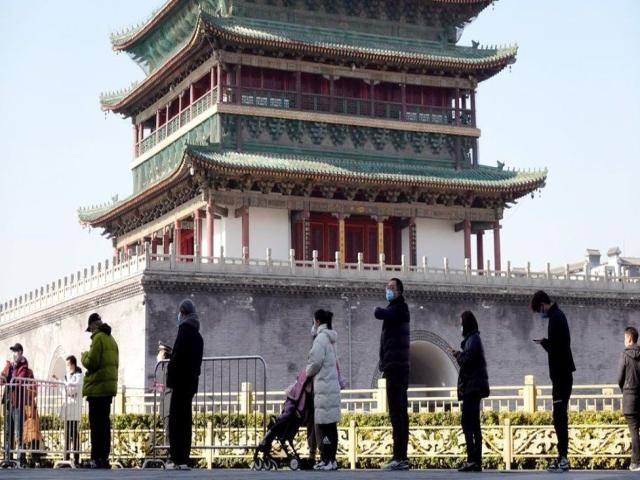Xian: Chinese city under lockdown as Covid cases rise

The northern city has recorded 143 infections since 9 December.
Under the new restrictions announced on Wednesday, only one person per household is allowed to leave home every two days to buy essential goods.
China has a strict zero-Covid strategy, using mass testing and lockdown to stop outbreaks.
The country is on high alert for Covid as it gears up to host the 2022 Winter Olympics in February.
Residents of Xi'an, known for its Terracotta Warriors, are not allowed to leave the city unless they have extenuating circumstances and approval from officials to so do. The restrictions came into effect at midnight on Thursday local time.
It is not yet known how long the restrictions will last.
How Delta threatens China's zero Covid plan
Testing times in the Olympic mountains
Millions of tests have been conducted in Shaanxi province, where Xi'an is located.
Long-distance bus stations have already closed and checkpoints have been installed on motorways into the city. A large number of flights from Xi'an's airport have been cancelled.
Non-essential businesses have closed and local government employees have been told to work from home.
Last weekend authorities had already closed indoor facilities such as bars, gyms and cinemas as a precaution, according to state-run Global Times.
Officials say the outbreak is the Delta variant of Covid and have not mentioned Omicron.
State media have been reporting this week that Xi'an is facing a "dual epidemic" as there have been "several reported cases of haemorrhagic fever, a natural epidemic disease with a high fatality rate". However, this is reported as being a "common" seasonal disease in northern China, and predominantly concentrated in rural areas.
China has admitted that Covid-19 remains the "biggest challenge" to the Winter Olympics.
The country, where the virus was first recorded, has confirmed more than 113,000 cases and 4,849 deaths.
The northern city has recorded 143 infections since 9 December.
Under the new restrictions announced on Wednesday, only one person per household is allowed to leave home every two days to buy essential goods.
China has a strict zero-Covid strategy, using mass testing and lockdown to stop outbreaks.
The country is on high alert for Covid as it gears up to host the 2022 Winter Olympics in February.
Residents of Xi'an, known for its Terracotta Warriors, are not allowed to leave the city unless they have extenuating circumstances and approval from officials to so do. The restrictions came into effect at midnight on Thursday local time.
It is not yet known how long the restrictions will last.
How Delta threatens China's zero Covid plan
Testing times in the Olympic mountains
Millions of tests have been conducted in Shaanxi province, where Xi'an is located.
Long-distance bus stations have already closed and checkpoints have been installed on motorways into the city. A large number of flights from Xi'an's airport have been cancelled.
Non-essential businesses have closed and local government employees have been told to work from home.
Last weekend authorities had already closed indoor facilities such as bars, gyms and cinemas as a precaution, according to state-run Global Times.
Officials say the outbreak is the Delta variant of Covid and have not mentioned Omicron.
State media have been reporting this week that Xi'an is facing a "dual epidemic" as there have been "several reported cases of haemorrhagic fever, a natural epidemic disease with a high fatality rate". However, this is reported as being a "common" seasonal disease in northern China, and predominantly concentrated in rural areas.
China has admitted that Covid-19 remains the "biggest challenge" to the Winter Olympics.
The country, where the virus was first recorded, has confirmed more than 113,000 cases and 4,849 deaths.
The northern city has recorded 143 infections since 9 December.
Under the new restrictions announced on Wednesday, only one person per household is allowed to leave home every two days to buy essential goods.
China has a strict zero-Covid strategy, using mass testing and lockdown to stop outbreaks.
The country is on high alert for Covid as it gears up to host the 2022 Winter Olympics in February.
Residents of Xi'an, known for its Terracotta Warriors, are not allowed to leave the city unless they have extenuating circumstances and approval from officials to so do. The restrictions came into effect at midnight on Thursday local time.
It is not yet known how long the restrictions will last.
How Delta threatens China's zero Covid plan
Testing times in the Olympic mountains
Millions of tests have been conducted in Shaanxi province, where Xi'an is located.
Long-distance bus stations have already closed and checkpoints have been installed on motorways into the city. A large number of flights from Xi'an's airport have been cancelled.
Non-essential businesses have closed and local government employees have been told to work from home.
Last weekend authorities had already closed indoor facilities such as bars, gyms and cinemas as a precaution, according to state-run Global Times.
Officials say the outbreak is the Delta variant of Covid and have not mentioned Omicron.
State media have been reporting this week that Xi'an is facing a "dual epidemic" as there have been "several reported cases of haemorrhagic fever, a natural epidemic disease with a high fatality rate". However, this is reported as being a "common" seasonal disease in northern China, and predominantly concentrated in rural areas.
China has admitted that Covid-19 remains the "biggest challenge" to the Winter Olympics.
The country, where the virus was first recorded, has confirmed more than 113,000 cases and 4,849 deaths.

Timeline of the coup: How Trump tried to weaponize the Justice Department to overturn the 2020
- A full year after the 2020 presidential election,are still emerging about former President Donald Trumps unprecedented effort to overturn the results.

Selecting a Pest Control Company
- Because is such a large built-up area, it contains many conditions that pests find appealing and beneficial

Top civil servant Simon Case quits No 10 party probe amid rule breach claims
- The UKs top civil servant has stepped aside from his role leading an inquiry into Downing Street lockdown parties, after it emerged an event was held

News Update Ukraine may have endured its worst week since the fall of Mariupol
- (CNN)Ukraines defense of Lysychansk -- the last city in the Luhansk region it still holds -- just became a lot more tenuous.